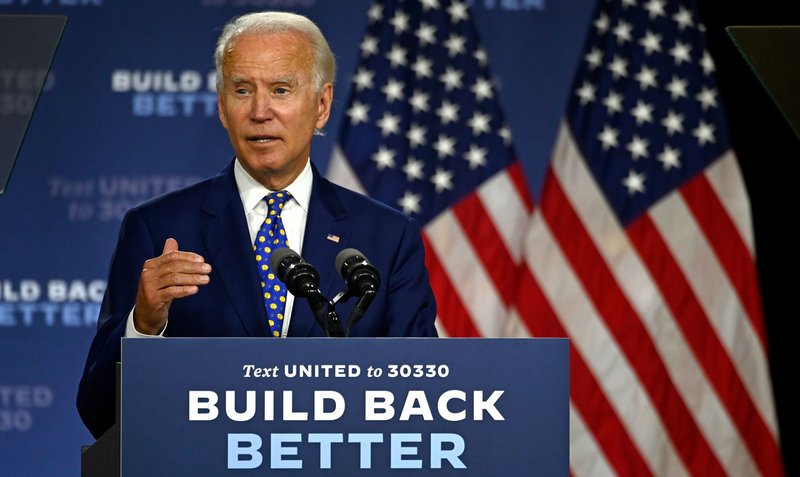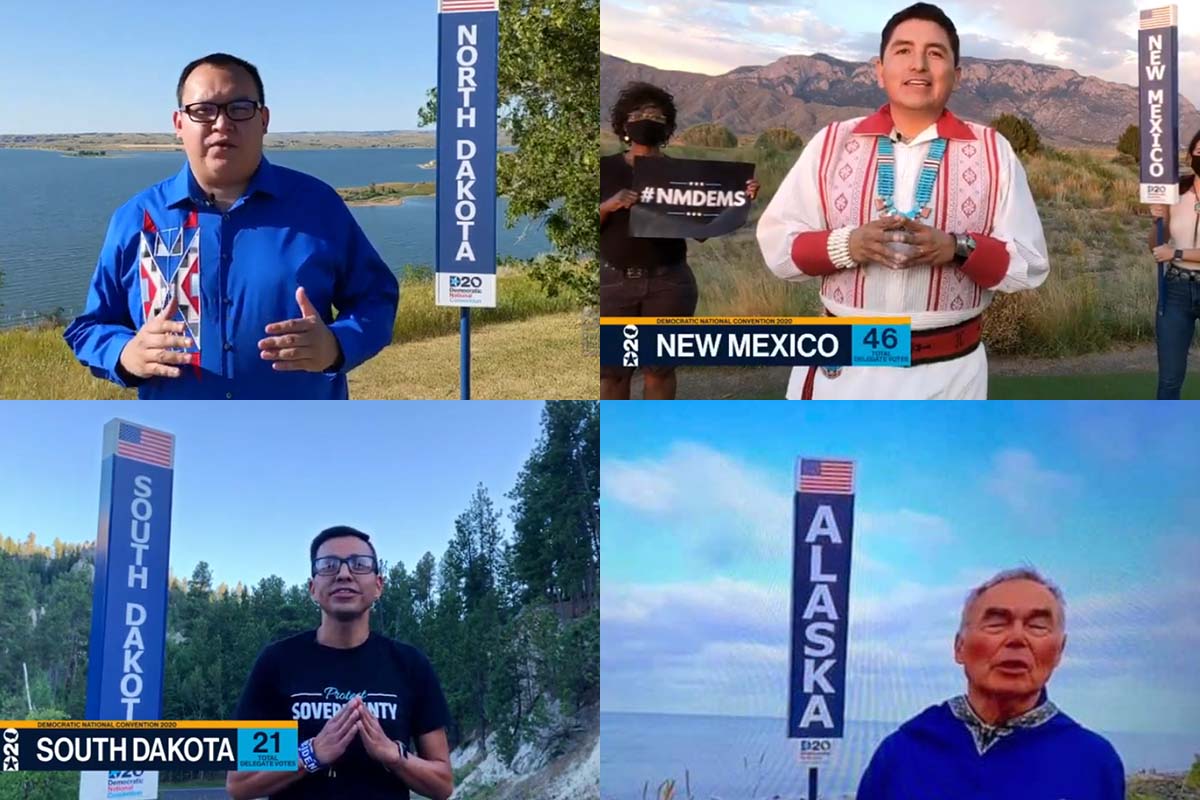
- Details
- By Levi Rickert
MILWAUKEE, Wis. — Former Vice President Joe Biden was officially nominated to be the Democratic Party’s presidential candidate in the 2020 election on Tuesday, the second night of the four-day Democratic National Convention. Bernie Sanders was the only opposing candidate to be nominated.
In the end, Biden drew 3,558 delegates to Sanders’s 1,151 from across 50 states and seven territories.
Though it was known since June 6 that Biden secured enough votes to capture the nomination, the official nominating process took place Tuesday night, as the Democratic National Convention conducted a virtual roll call for the first time ever.
The virtual roll call provided local backdrops to a process that is normally conducted in crowded convention arenas with thousands of celebrating delegates.
 Clockwise from top left: Delegates Cesar Alvarez (Hidasta and Arikara Nation) from North Dakota, State Rep. Derrick Lente (Sandia Pueblo) from New Mexico, Chuck Degnan (Yup’ik, Unupiaq) from Alaska and Kellen Returns From Scout (Standing Rock Sioux Tribe) from South Dakota delivered 2020 DNC roll call remarks.
Clockwise from top left: Delegates Cesar Alvarez (Hidasta and Arikara Nation) from North Dakota, State Rep. Derrick Lente (Sandia Pueblo) from New Mexico, Chuck Degnan (Yup’ik, Unupiaq) from Alaska and Kellen Returns From Scout (Standing Rock Sioux Tribe) from South Dakota delivered 2020 DNC roll call remarks.
The format provided Indian Country an opportunity to display some local color through representation by four Native Americans from their respective states of Alaska, New Mexico, North Dakota and South Dakota.
Recording the votes for the Alaskan delegation was Chuck Degnan (Yup’ik, Unupiaq), who stressed that climate change is impacting tribal waters in his state. Dressed in tribal attire, state Rep. Derrick Lente (Sandia Pueblo) cast New Mexico’s votes. Cesar Alvarez (Hidasta and Arikara Nation), also mentioned his Hispanic heritage as he cast North Dakota’s votes. Kellen Returns From Scout (Standing Rock Sioux Tribe) cast South Dakota’s votes with the Black Hills behind him.
Earlier in the evening, Navajo Nation President Jonathan Nez represented Indian Country via video as one of 17 keynote speakers. Nez, who is in the second year of his first term as president of the nation’s largest Indian reservation, has led the Navajo Nation through unprecedented times, as the Navajo were hit hard by the COVID-19 pandemic.
In his remark, Nez — perhaps referring to President Donald Trump — questioned those who put politics over public health, saying he is proud to be a part of a party that believes in science.
The Navajo Nation has reported 9,486 positive COVID-19 cases since March, and nearly 500 Navajo citizens have died.
“I proudly support Joe Biden and Kamala Harris. As President of the Navajo Nation, I must align with the ticket that serves my people. My job is to lead. I wish I could be with all of you in person, but I am proud to be a member of a party that believes in science. It’s our job to model leadership — to put public health above politics — and that’s what we’re doing with this convention,” Nez said in a statement to Native News Online.
Nez says the United States is in a moral crisis, which has left our nation reeling in anguish and anger over systemic racism.
Biden will formally accept the nomination on Thursday night.
More Stories Like This
Native News Weekly (August 25, 2024): D.C. BriefsNavajo Nation Mourns the Passing of Former Vice President Rex Lee Jim
Deb Haaland Earns Endorsement From Communications Workers of America Local 7076
University Soccer Standout Leads by Example
Two Native Americans Named to Democratic Congressional Campaign Committee's“Red to Blue” Program
Help us defend tribal sovereignty.
At Native News Online, our mission is rooted in telling the stories that strengthen sovereignty and uplift Indigenous voices — not just at year’s end, but every single day.
Because of your generosity last year, we were able to keep our reporters on the ground in tribal communities, at national gatherings and in the halls of Congress — covering the issues that matter most to Indian Country: sovereignty, culture, education, health and economic opportunity.
That support sustained us through a tough year in 2025. Now, as we look to the year ahead, we need your help right now to ensure warrior journalism remains strong — reporting that defends tribal sovereignty, amplifies Native truth, and holds power accountable.
 The stakes couldn't be higher. Your support keeps Native voices heard, Native stories told and Native sovereignty defended.
The stakes couldn't be higher. Your support keeps Native voices heard, Native stories told and Native sovereignty defended.
Stand with Warrior Journalism today.
Levi Rickert (Potawatomi), Editor & Publisher

